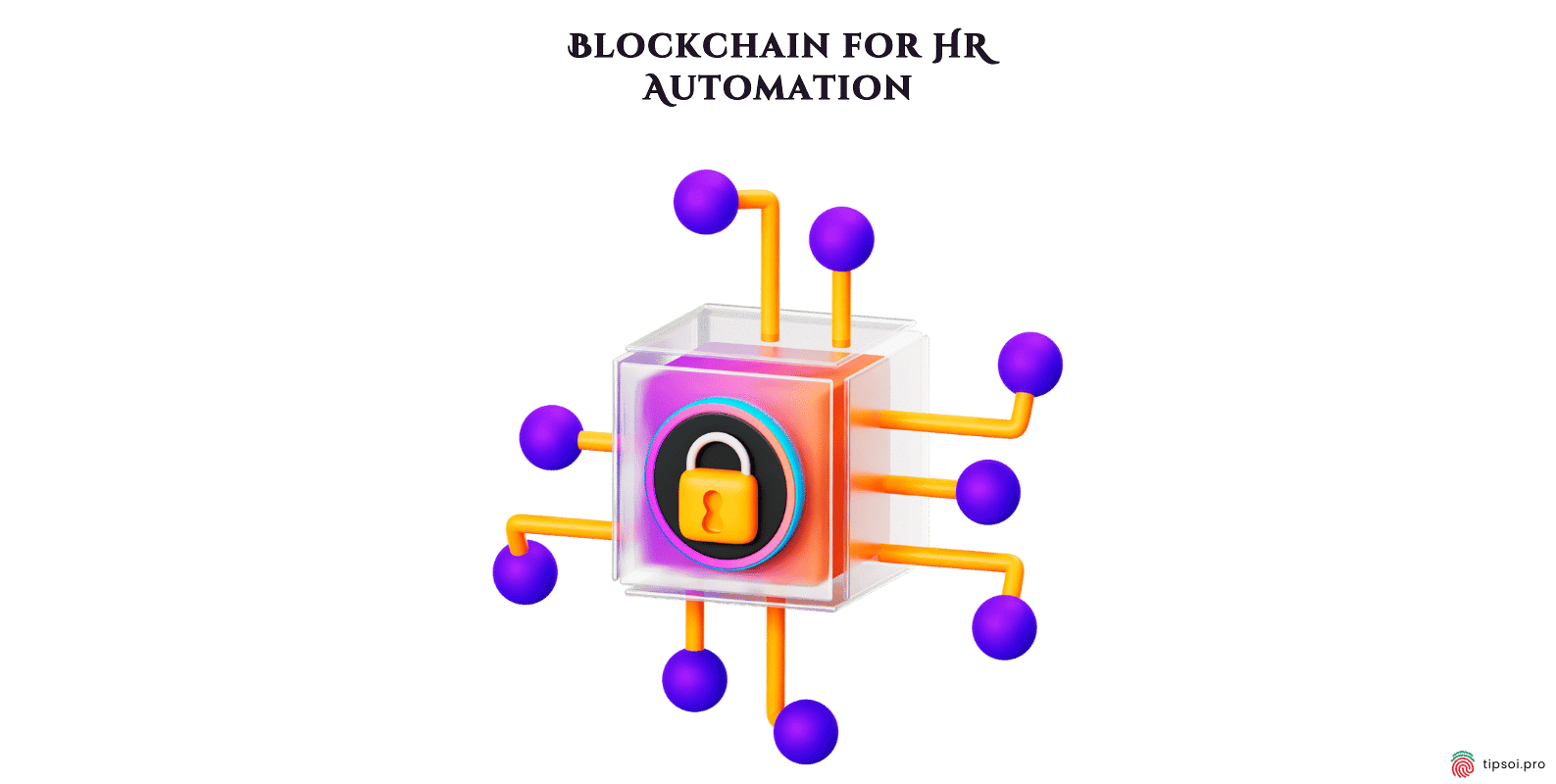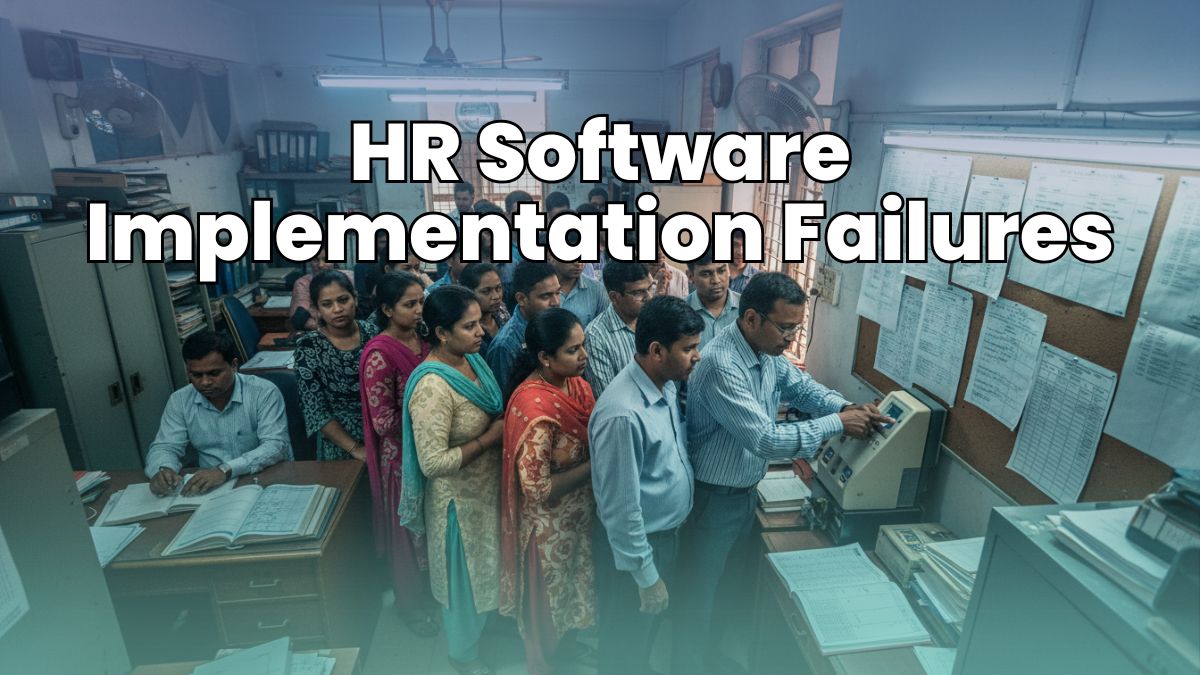Tired of wasting hours verifying job applications or getting burned by resume fraud? You’re not alone. Leading companies like IBM and Workday are already enjoying blockchain’s role in HR automation to hire faster, pay smarter, and keep employee data ultra-secure.
In a workplace that never stands still, traditional HR practices—think piles of paperwork, endless verification steps, and manual payroll routines—often leave teams spinning their wheels. As the saying goes, out with the old and in with the bold: blockchain’s role in HR automation is turning the page by modernizing recruitment, tightening compliance, safeguarding sensitive information, and freeing departments from mountains of red tape.
Today, blockchain’s role in HR automation is writing a new chapter for HR where trust is built-in by design, and efficiency isn’t just a nice-to-have—it’s business as usual.
Originally known as the technology behind Bitcoin, blockchain has evolved into a powerful tool that injects new levels of transparency and automation into HR operations.
Ever wished your HR department ran like a well-oiled machine, handling everything from payroll to performance reviews at the click of a button? Thanks to blockchain’s role in HR automation, that future is closer than ever. HR teams can now simplify and automate tasks while boosting security, speed, and transparency across the board.
In this article, we’ll explore practical uses and real-life examples of blockchain’s role in HR automation, offering a big-picture overview of this rising trend.
What is this ‘Blockchain’?
Imagine a massive digital ledger spread across a network of computers, all working together like a team of vigilant lawyers who meticulously record every transaction to keep everything transparent, secure, and tamper-proof. In the world of human
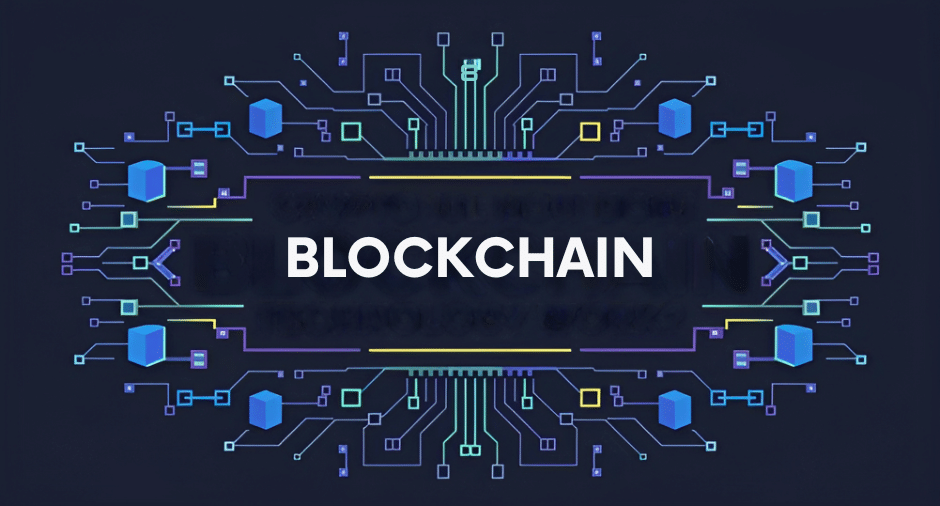
resources, blockchain technology introduces a whole new way to handle employee data, simplify complex tasks, and transform how companies operate.
Key Benefits of Blockchain in HR Automation
Blockchain’s role in HR automation is not just about fancy tech—it delivers real perks that help HR teams leave old headaches behind and move forward with confidence. Here are the key benefits it brings to the table:
- Tamper-proof Records: Once information is added to the blockchain, it’s locked in tight. This means employee data and audit trails are nearly impossible to alter, ensuring integrity and trust.
- Faster Verification: Verifying credentials, work history, and certifications becomes a breeze, cutting down hiring time and eliminating fraud.
- Automated Payroll & Contracts: Smart contracts instantly execute payments and enforce agreements, reducing errors and delays that used to slow things down.
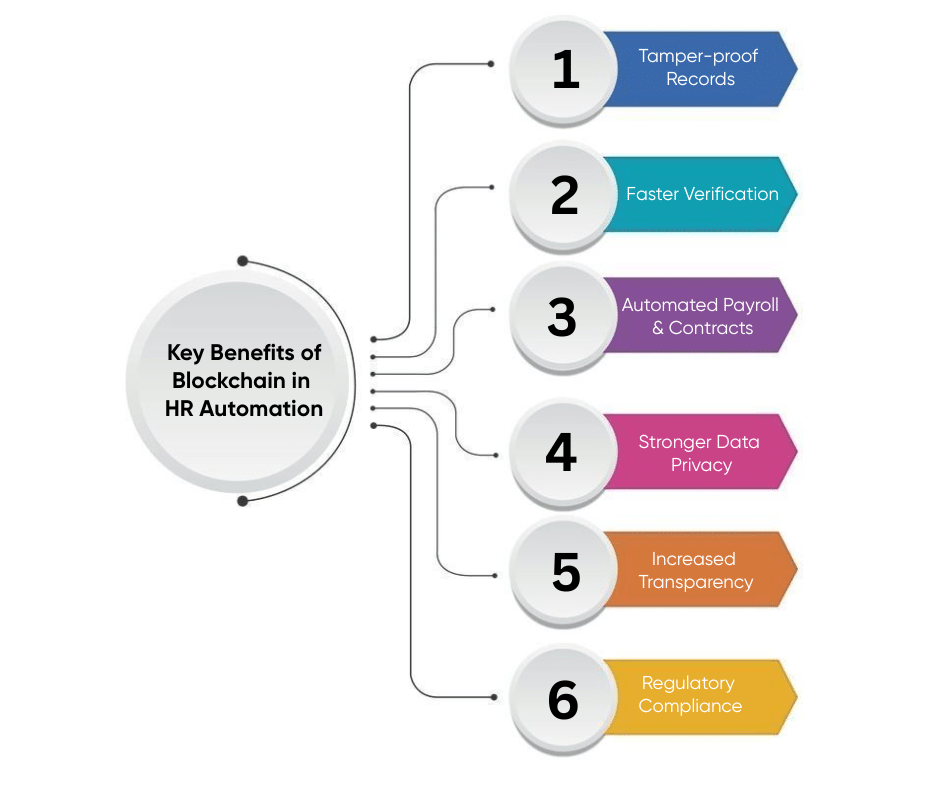
- Stronger Data Privacy: Encryption and permission layers protect sensitive HR data from breaches while still allowing authorized access.
- Increased Transparency: Every transaction is traceable on the blockchain, giving employers and employees clear visibility into HR processes.
- Regulatory Compliance Made Simple: Detailed, immutable records simplify audits and help meet laws like GDPR without sweating over paperwork.
By taking the guesswork and grunt work out of routine HR tasks, blockchain empowers HR professionals to focus on people, strategy, and growth rather than paperwork and verification.
A Blockchain-Powered HR Department
These advantages highlight the transformative potential of blockchain for HR automation in building a more secure, efficient, and employee-centric workplace.
- Supercharged Security: Remember those data leaks where employees’ private information ended up exposed? Thanks to blockchain’s autonomous nature, hacking is nearly impossible. Think of blockchain as a castle with an army of digital guards protecting your employee data.
- Lightning-Fast Processes: Blockchain speeds up everything — from hiring to payroll — giving HR teams the freedom to focus on what really matters. It’s like swapping out your old clunker for a sleek sports car.
- Transparency and Trust: No one can alter blockchain records, which builds solid trust between employers and employees. Every action — from pay changes to promotions — is recorded clearly. It’s like giving your HR team a daily dose of truth.
- Empowered Employees: With self-sovereign identity systems based on blockchain, employees control their own data. They decide what to share, creating a workplace founded on trust and freedom. It’s the rise of a new digital empowerment.
The Challenges in the Workplace
In the workplace, we encounter issues that require solutions that are equitable for everyone:
- Trouble Getting Talent: It’s hard to find eligible workers and match them with jobs, which makes recruitment and hiring harder. It’s like trying to pick out the right note in a bunch of noise.
- Worker Costs: In talent markets that don’t work well, employers pay big fees (15–30% of the contract cost) to middlemen. Meanwhile, agencies and freelancers often have to wait months before they receive payment. It’s a problem with money.
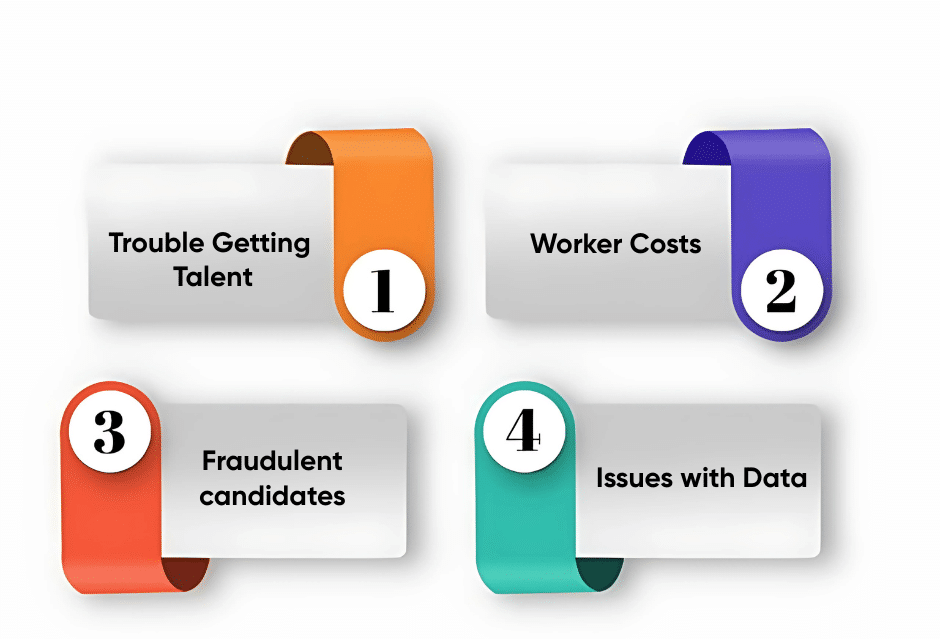
- Fraudulent candidates: lies on CVs—more than half of applicants lie about their skills. A phrase like “studied at Harvard” could also mean “studied Harvard Business Review.”Yes, there is dishonest fraud out there.
- Issues with Data: Data centralisation and social media are sources of concern. People are hesitant to share personal information, like work experiences, on public networks.
Blockchain for HR Automation presents innovative solutions to tackle these challenges head-on, streamlining processes and enhancing trust.
The Blockchain Crescendo: How It Helps HR
Let’s explore how blockchain’s role in HR automation can specifically address these pain points and revolutionize the way HR operates. The blockchain tools:
- Verifying Credentials: Recordings of job abilities are immutable thanks to blockchain technology. Stop making that “Harvard” note up.
- Quick Payments: Smart contracts simplify payments, which cuts down on the costs of middlemen. The days of waiting months for payment are over.
- Safe Identity: Blockchain makes it easier to prove who you are. Having an immutable secret pass is similar to that.
- Transparent Transactions: Any update to the ledger is immediately visible to all users. Anyone can play a tune because everyone knows the notes.
Let’s examine some concrete examples of how blockchain for HR automation is already making waves in the real world.
Real-World Examples: Blockchain for HR Automation
These instances demonstrate the tangible impact of blockchain’s role in HR automation across diverse industries and functions.
- IBM: IBM transformed its global staff management system by adopting blockchain technology. This switch allows managers to efficiently track and verify employees’ skills, licenses, and experience across borders. The result? Significant time savings and smoother HR processes worldwide.
- Workday: Workday enhanced its HR platform by integrating blockchain to safeguard employee data and accelerate payroll and benefits management. Clients report increased data security and streamlined workflows, drastically reducing administrative burdens.
- ChronoBank: ChronoBank is pioneering an open labor market in Australia using blockchain. By connecting companies directly with workers and removing intermediaries, ChronoBank cuts recruiting costs and ensures transparent, speedy payments.
- Infosys: Infosys leveraged blockchain technology to cut recruitment processing time by 55%. Automating credential verification not only shortened hiring cycles but also strengthened protection of sensitive applicant information.
- NICE: NICE fully automated access control across systems using blockchain, saving 5,000 hours of manual work. This boost in operational efficiency freed up HR teams to focus on strategic initiatives.
- BAE Systems: BAE Systems achieved a 100% return on investment by deploying 60 “digital workers” powered by blockchain. These digital workers handle routine HR tasks, increasing accuracy and reducing costs.
- Banque Internationale à Luxembourg: Banque Internationale à Luxembourg hired 49 digital workers to automate 60 processes, also realizing a 100% ROI. The result is faster task completion and improved reliability in HR operations.
- Central England Co-operative: Central England Co-operative purged 10,000 outdated employee records using blockchain. This cleanup saved valuable time and enhanced data management efficiency.
Blockchain Use Cases in HR
Ready for a peek at how blockchain is jazzing up HR? Check out this table to see the coolest use cases, the biggest benefits, and which companies are already living in the future. Strap in—HR’s never looked this fun!
| Use Case | Main Benefit | Real-World Example |
|---|---|---|
| Payroll Automation | Lower fees, faster payments | Bitwage, ChronoBank |
| Credential Verification | Fraud reduction, accelerated hiring | IBM, Workday |
| Smart Onboarding Contracts | Fewer errors, automated compliance | Workday |
| Employee Data Security | Reduced risk, easier audits | Estonian Gov. |
| Talent Marketplace | Cost savings, instant settlements | ChronoBank |
| Performance/Benefits Recording | Transparency, customizable rewards | AlbiCoin |
Frequently Asked Questions (FAQs)
What specific HR processes can benefit from blockchain automation?
Blockchain can streamline various HR processes, including recruitment & onboarding (verifying credentials), payroll (smart contracts for automated payments), performance management (transparent record-keeping), and employee data management (secure and self-sovereign identity).
How does blockchain enhance security in HR?
Blockchain’s decentralized and immutable nature makes it highly resistant to hacking and tampering, safeguarding sensitive employee data and ensuring trust.
Can blockchain really speed up HR processes?
Yes, by automating manual tasks, eliminating intermediaries, and enabling real-time verification, blockchain significantly accelerates processes like recruitment, onboarding, and payments.
Will blockchain replace HR professionals?
No, blockchain empowers HR professionals by automating repetitive tasks, allowing them to focus on strategic initiatives and building meaningful relationships with employees.
Are there any real-world examples of companies using blockchain in HR?
Yes, companies like IBM, Workday, and ChronoBank are already leveraging blockchain for HR automation to improve efficiency, transparency, and security.
What is the future of blockchain in HR automation?
The future holds immense potential, with advancements like skills-based recruitment, smart contracts for performance management, and decentralized autonomous organizations (DAOs) transforming the HR landscape.
Is blockchain compliant with data protection regulations like GDPR?
When implemented properly, blockchain platforms can comply with data privacy laws by using encryption, selective access controls, and allowing individuals to manage their own information securely.
What challenges does blockchain address in traditional HR?
It tackles slow manual verification, high recruitment costs, data privacy concerns, and lack of transparency by providing a decentralized, tamper-proof ledger and automating processes via smart contracts
Can blockchain support remote or global HR processes?
Yes. Blockchain enables near real-time, secure, and transparent cross-border payroll processing and employee record management, ensuring compliance with international laws and faster payment settlements.
How can blockchain help prevent fraudulent job applications?
Blockchain stores immutable, verified credentials and employment histories, drastically reducing resume fraud and speeding up candidate verification by allowing instant, tamper-proof credential checks.
What are smart contracts and how do they benefit HR?
Smart contracts are self-executing agreements on the blockchain that automate payroll, bonuses, compliance checks, and other HR workflows, improving accuracy, transparency, and speed without manual intervention.
Is blockchain secure for handling sensitive employee data?
Yes. Blockchain encrypts employee data and controls access permissions strictly, ensuring privacy and data integrity while providing transparency only to authorized parties
A Look into the Future: The Road Ahead
The possibilities of blockchain’s role in HR automation are vast. Our understanding of blockchain’s role in HR automation is still in its early stages.
- Skills-Based Recruitment: The more powerful the technology gets, the more imaginative applications it will have. For example, skills-based recruitment will use blockchain-based certificates to check candidates’ skills and experience, which will make hiring faster and more accurate.
- Smart Contracts: Smart contracts automate complex processes, such as calculating bonuses and performance reports, and they guarantee transparency and fairness.
- Decentralized Organizations (DAOs): Blockchain-based DAOs have the potential to revolutionise business operations by enabling employee decision-making.
In a Nutshell: Your HR Department, Transformed
Blockchain for automation isn’t meaninglessness; it’s a game-changer for HR automation. By embracing this technology, companies can unlock a new level of efficiency, transparency, and employee empowerment. By embracing blockchain for HR automation, organizations can unlock a future of streamlined processes, enhanced security, and empowered employees. So, buckle up and get ready for the ride, the future of HR is here, and it’s powered by blockchain!

